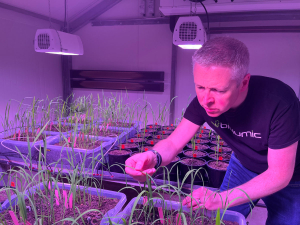AgriZeroNZ invests in methane-reducing tech
A US-based company developing a vaccine to reduce methane emissions in cattle has received another capital injection from New Zealand’s agriculture sector.
 Jason Wargent, founder and chief science officer of BioLumic, observing rice seedlings under UV Light.
Jason Wargent, founder and chief science officer of BioLumic, observing rice seedlings under UV Light.
AgriZeroNZ, a joint venture fast-tracking emissions reduction tools for farmers, is pouring $5 million in a biotech company to develop a low emissions farm pasture with increased productivity gains.
Founded in New Zealand, BioLumic is internationally acclaimed for its unique and proprietary UV Light Treatments which are applied to seeds to regulate their genetic expression and unlock their natural genetic potential. These treatments have been found to significantly improve plant performance across 12 crops including corn, soybeans and rice - driving double digit yield gains, improved quality and enhanced immunity to pathogens.
AgriZeroNZ funding will enable BioLumic to apply its technology to ryegrass, the most common forage pasture on New Zealand farms, with a goal to increase fat content and subsequently reduce methane emissions from animals that consume it.
AgriZeroNZ chief executive Wayne McNee says this could deliver a simple solution to reduce emissions on New Zealand’s predominantly pasture-based farms, to help meet the global customer demands for emissions reduction, protect trade agreements, and achieve New Zealand’s climate goals.
“Pasture is the foundation of the business for Kiwi farmers, so a pasture solution to curb methane and boost productivity will be an important option in their toolkit to reduce emissions.
“BioLumic’s work is an exciting prospect to help secure the future of farming in New Zealand with the very thing that makes our agricultural sector unique and drives our competitive edge today - high quality grass.
“They have achieved promising results on ryegrass to date. We’re looking forward to seeing how it progresses,” McNee said.
Animals with high-fat diets have lower methane emissions, such as grain-fed cattle in more intensive barn farming operations overseas. Studies* have found that a 1 per cent increase in lipids (fat) content of feed will reduce methane emissions by ~5 per cent. BioLumic is targeting a 2-3% increase in the lipids content of ryegrass to drive methane reduction by over 12 per cent.
Based in Palmerston North and with offices in the United States, BioLumic was founded in 2013 by Dr Jason Wargent, the company’s chief science officer and a Professor in Plant Biology at Massey University.
Funding from AgriZeroNZ was part of BioLumic’s capital raise to enable application of its suite of products to address major sources of greenhouse gas emissions.
“We’ve developed light recipes from billions of potential options that, with a precise application, can significantly increase plant performance across a range of crop varieties and growing conditions,” Wargent said.
“We’re confident we can achieve similar results in ryegrass with a focus on reduced methane, and we’re really pleased to be working with AgriZeroNZ to develop this important solution for New Zealand to put farmers at the forefront of low emissions pasture farming.”
Wargent said the company is targeting wide scale use from 2027, with reduced regulatory barriers expected from the light treatment approach which will support a faster speed to market.
This is the sixth major investment by AgriZeroNZ to accelerate the development of emissions reduction tools and technologies for Kiwi farmers, having committed over $22 million to date.
Other investments include funding for a methane inhibiting bolus, novel probiotics, New Zealand research for a methane vaccine and inhibitor, and construction of a greenhouse gas testing facility.
McNee said the JV is aiming to have two to three emissions reduction tools in widespread use by 2030.
“There is a very real and very disruptive risk to our dairy and meat sectors from the need to reduce emissions but there is also a very real opportunity to stay among the most efficient producers of dairy products and meat in the world if we can get the right tools to farmers,” McNee says.
The World Wide Sires National All Day Breeds Best Youth Camp Best All Rounder plaudit has become family affair, with 2026 Paramount Cup winner Holly Williams following in her sister Zara's footsteps.
DairyNZ is giving New Zealand farmers a unique opportunity to gain hands-on governance and leadership experience within the dairy sector.
Herd improvement company LIC has posted a 5.2% lift in half-year revenue, thanks to increasing demand for genetics.
According to the latest Fresh Produce Trend Report from United Fresh, 2026 will be a year where fruit and vegetables are shaped by cost pressures, rapid digital adoption, and a renewed focus on wellbeing at home.
The Roar is a highlight of the game hunting calendar in New Zealand, with thousands of hunters set to head for the hills to hunt male stags during March and April.
OPINION: The past few weeks have been tough on farms across the North Island: floods and storms have caused damage and disruption to families and businesses.